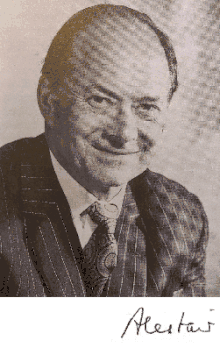Alastair Pilkington
Sir Lionel Alexander Bethune Pilkington OBE FRS[1] (7 January 1920 – 5 May 1995), known as Sir Alastair Pilkington, was a British engineer and businessman who invented and perfected the float glass process for commercial manufacturing of plate glass.
Alastair Pilkington | |
|---|---|
 | |
| Born | 7 January 1920 Calcutta, India |
| Died | 5 May 1995 |
| Alma mater | Trinity College, Cambridge |
| Occupation | Engineer |
| Engineering career | |
| Significant advance | float glass process |
Early life
Born on 7 January 1920 in Calcutta, India,[2] he was the son of Colonel Lionel George Pilkington MC and his wife Evelyn Carnegie Bethune, sister of Sir Alexander Maitland Sharp Bethune, 10th Baronet. He was educated at Sherborne School and Trinity College, Cambridge,[3] where his studies were interrupted by the outbreak of World War II. Joining the Royal Artillery, he was captured in the Battle of Crete and spent four years as a prisoner of war in Nazi Germany. Returning to university, he obtained a degree in mechanical science, followed in 1947 by a job as technical officer with the glass manufacturers Pilkington Brothers.[4] He was not related to the Pilkington family which then controlled the business.[3]
Business career
In 1952 Pilkington invented the float glass process, in which molten glass was "floated" over a bath of molten tin and manipulated to achieve the required product thickness,[5] and with his associate Kenneth Bickerstaff,[6] spent seven years perfecting and patenting its commercially successful manufacture. American inventors had tried several times to achieve an improved and lower-cost process to replace the costly plate glass, but had not succeeded. His breakthrough was announced to the glassmaking world on 20 January 1959[4] and enabled Pilkingtons to dominate the world market for high quality flat glass for many years.[7] Starting in the early 1960s, all the world's leading flat glass manufacturers obtained licences to use the float glass process. From technical director of Pilkingtons in 1955, he became deputy chairman in 1971 and chairman from 1973 until he reached retirement age in 1980, leaving the board in 1985.[3][8] For the rest of his life he was the company's president.[9]
Outside activities and honours
In 1969 Pilkington was appointed a Fellow of the Royal Society and in 1970 a Knight Bachelor, as well as receiving the Wilhelm Exner Medal.[10] In 1978 he was awarded the A. A. Griffith Medal and Prize and in 1983–1984 served as president of the British Science Association.[9]
Outside directorships included appointments as a director of the Bank of England from 1974 to 1984 and a director of BP from 1976 to his death. A passionate advocate of tertiary education, he was from 1980 to 1990 Pro-Chancellor of Lancaster University, from 1990 Chairman of the Campaign for the University and Colleges of Cambridge and from 1994 to his death Chancellor of the University of Liverpool.[11] He was chairman of the Council for National Academic Awards (CNAA) from 1983 to 1987.
The Pilkington Awards were established at Lancaster University in 1985 through funds donated by Sir Alastair Pilkington. These consist of cash grants for three undergraduates registered at Lancaster University for a single major or combined degree in chemistry, computing, engineering or physics.[12] Since the mid-1990s, the University of Liverpool has used the annual Sir Alastair Pilkington Awards to honour staff members for their contributions to student learning.[13]

A building at the University of Liverpool was named in his honour until May 2022, when it was renamed Gillian Howie House.[14] A reading room in Lancaster University's library is named in his honour.[15][16]
Family
In 1945 in London he married Patricia Nicholls Elliott, a former Women's Royal Naval Service officer[17] who was the daughter of Rear-Admiral Frank Elliott OBE, and they had a daughter together with an adopted son. After his wife's death, in 1978 he married the American former radio actress Leila Kathleen Wilson, widow of Eldridge Haynes.
References
- Oxley, B. W. (2022). "Lionel Alexander Bethune (Alastair) Pilkington. 7 January 1920—5 May 1995". Biographical Memoirs of Fellows of the Royal Society. 74: 339–361. doi:10.1098/rsbm.2022.0025. S2CID 254878265.
- Ancestry.com. England & Wales, Death Index, 1916–2007 [database on-line]. Provo, UT, US (subscription required) Accessed 3 December 2015
- "Pilkington PLC biography – Sir Alastair Pilkington". pilkington.com. Archived from the original on 5 March 2007.
- "The Inventor of Float Glass". pilkington.com. Retrieved 27 July 2021.
- "BBC – History – Sir Alastair Pilkington (1920–1995)". BBC. Archived from the original on 13 January 2005.
- U.S. Patent 2,911,759 – Manufacture of float glass, issued 10 November 1959
- Pilkington, L. A. B. (1969). "Review Lecture. The Float Glass Process". Proceedings of the Royal Society of London. Series A, Mathematical and Physical Sciences. 314 (1516): 1–25. Bibcode:1969RSPSA.314....1P. doi:10.1098/rspa.1969.0212. JSTOR 2416528. S2CID 109981215.
- Who's Who 1988
- "OBITUARIES ; Sir Alastair Pilkington". The Independent. 23 October 2011. Retrieved 27 July 2021.
- editor, ÖGV. (2015). Wilhelm Exner Medal. Austrian Trade Association. ÖGV. Austria.
- "OBITUARIES ; Sir Alastair Pilkington". The Independent. 23 October 2011.
- "The Pilkington Awards - Lancaster University". Archived from the original on 15 August 2020.
- "LTSE Awards and Sir Alistair Pilkington Awards - Academic Development - University of Liverpool". liverpool.ac.uk. Retrieved 12 June 2022.
- "Stories - Department of Philosophy - University of Liverpool". liverpool.ac.uk. Retrieved 12 June 2022.
- "University of Liverpool Maths School - Sir Alastair Pilkington Building" (PDF). Archived (PDF) from the original on 23 January 2021.
- Robson, Sheppard (2015), English: The main library of Lancaster University, with the Sir Alastair Pilkington Reading Room in the background., retrieved 27 July 2021
- "The London Gazette, 3 April, 1942" (PDF). thegazette.co.uk. Retrieved 3 December 2015.